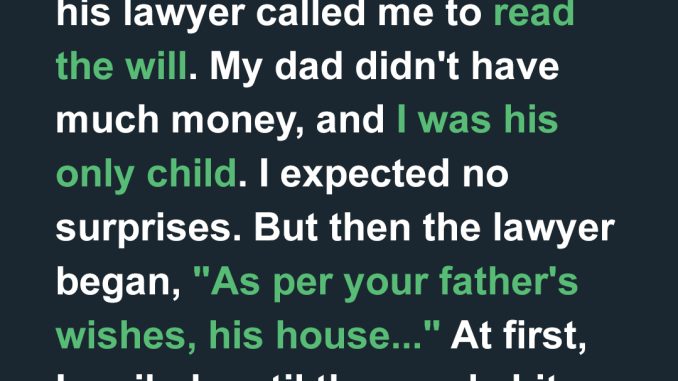
When my father passed away, I thought I’d already lost everything. But then I learned he’d left me a house I’d never even heard of—and it led me straight into a past I never knew existed.
It was pouring rain the day I walked to the notary’s office, coat pulled tight and heart heavier than ever. My father was gone, and with him went the only constant I’d ever known. Debts had piled up, and now even the house we’d lived in was slipping through my fingers.
I was expecting more bad news. But then, the notary flipped through my father’s will and said something that snapped me out of my fog.
“There’s a second property.”
I blinked. Another house? My father had never said a word about it. My hands shook as I read the address. I didn’t recognize it. Had he kept it secret from me? Was this his way of making amends?
I had to find out.
The next morning, I drove through a quiet stretch of golden trees to see the house for myself. It was charming in a worn, nostalgic way—moss on the roof, sun flickering through tall windows. But something felt off.
I tried the key the notary had given me. It didn’t work.
Then the door burst open.
A woman in her sixties stood in the doorway, her sharp eyes locking on mine. “Can I help you?” she asked, cool and firm.
“This house was left to me by my father,” I told her.
Her response? “I’ve lived here for twenty years. This isn’t your house.”
I showed her the paperwork. She didn’t care.
We argued. The tension thickened. Neither of us was backing down.
Eventually, she stepped aside. “Fine. Come in. But don’t expect me to be nice about it. I’m Deborah.”
Inside, the house smelled lived-in. Like history and heartache. I called my lawyer. Legally, the house was mine—for now.
I told Deborah I’d be staying until things were sorted. She didn’t argue. But she made it clear I wasn’t welcome.
Living with her was like surviving a slow war. She slammed cabinets at midnight, sabotaged the plumbing, and hid my things in bizarre places. I knew she was trying to drive me out.
And yet, beneath the petty battles, I saw something else—loneliness. Fear. Desperation.
Then came the final straw: the morning of an important meeting, I found my freshly laundered clothes dumped in the mud.
I confronted her, furious. “Why are you doing this? What did I ever do to you?”
Her answer cut deeper than any insult.
“You don’t belong here,” she said. “This house was never meant for you.”
And then, the truth spilled out.
Years ago, Deborah had been with my father. They’d had a child—me. But after a painful breakup, he’d taken me and erased her from my life.
“He told you I was dead, didn’t he?” she whispered. “But I’m your mother.”
She handed me a bracelet engraved with my name and birthdate.
I could barely breathe.
She’d made mistakes, left, tried to come back—but he had shut her out. And now, after all these years, we were strangers colliding in a house full of memories.
When the court date came, it was ruled that Deborah had the legal right to the house. Her years of occupancy, upkeep, and bills made her the rightful owner.
I packed my bags.
But as I was leaving, she stopped me.
“I don’t want you to go,” she said. “You’re my daughter, Emily. I’ve already lost you once. I don’t want to lose you again.”
I turned, stunned.
“I want to try,” she said, voice trembling. “To fix this. If you’ll let me.”
I stepped forward and hugged her.
“I want that too… Mom.”
In the weeks that followed, we cleaned, shared stories, and slowly rebuilt a bond we’d never had the chance to form. The house that once felt like a battlefield became a place of healing.
And in it, I learned this: sometimes the family we lose finds its way back—not through blood or legality, but through forgiveness.
And that changes everything.
Leave a Reply